- Home
- Alexandra Bracken
Lore Page 6
Lore Read online
Page 6
Their annihilation had come shortly after the bloodlines had decided upon unified surnames to meet the changing legal needs of the sixteenth century. Both houses had been viewed as unworthy of the hunt, even by Jason’s cursed line. Meleager’s because the remaining descendants originated from an illegitimate child, and Bellerophon’s because their ancestor had died hated by the gods, and only Zeus himself would have seen the fallen hero redeemed.
“I thought Hercules—Herakles? I thought he rode Pegasus?” Miles said. “Are you telling me my favorite animated film of all time lied to me?”
Lore sighed.
“I’m almost afraid to ask,” Miles said. “But what exactly happened to the rest of your family?”
For a moment, Lore wasn’t sure where to begin.
“There’s this rule—this fundamental belief—that only men, in particular the agreed-upon head of each bloodline, should be allowed to claim the power of a god,” Lore explained, anger turning her posture rigid. “Only men can be heirs, both in mortal and immortal power. Having a male leader of a bloodline means succession is clearer. Should that archon fall or ascend to immortality, authority falls to his sons, or brother, or nephew. When the bloodline gathers for the next Agon, they cast votes on the next man to hold the title.”
Her disgust grew until she could taste the bitterness in her mouth at the explanation. She had once believed all of that, too—more than believed in it. Even as a child, Lore would have gladly died on behalf of all those men to maintain the cruel order of their world.
“They really shut women out like that?” Miles asked. “Even now?”
Her nostrils flared with the force of her next breath. “It was centuries before they allowed women to hunt at all, and now only a select few are chosen to work in a sort of pack on behalf of the archon. Tidebringer, whether intentionally or by accident, claimed godhood herself fourteen cycles ago. And not from just any god, but one of the originals. Poseidon.”
It was strange to feel both deeply ingrained revulsion and sympathy for the new god. Lore had been taught to hate her, to blame her for what became of the House of Perseus. Over and over, she’d been told Tidebringer was wrong, as if the unnatural thing wasn’t that a mortal had killed a god and taken his place, but that a woman had dared to try.
“Okay, but why would the Poseidon lady mean the death of your . . . house?” Miles asked, hesitating over the word. “I thought you said that the new gods protect and serve their family?”
“That’s just it,” Lore said. “She was shunned by the Perseides and was forced into hiding during the next Agon and all of the ones that came after because she had no family to protect her. The bloodlines saw her as a direct threat to the order of their world. No one had even been sure a woman could ascend until she’d done it. The idea was too dangerous to them.”
Miles sighed. “I think I know where this is going.”
“To make sure it never happened again, the other families, led by the archon of Kadmos’s bloodline, destroyed almost the entire House of Perseus on the last day of that Agon, when the killing of other hunters was still permitted,” Lore said. “Aside from Tidebringer, the only survivor was my great-great-grandfather, who had decided to stay at university instead of participate in that cycle.”
“Holy shit,” Miles said mildly.
“The other bloodlines decided to keep him alive to torment him a different way—humiliation,” Lore said. “They split the Perseides’ stores of weapons and armor, divvied up their lucrative shipping and textile-manufacturing empires, and gave the head of the Kadmos bloodline the family’s greatest inheritance.”
The aegis. The shield of Zeus, carried into so many battles by his favorite daughter, Athena, bearing the head of the gorgon Medusa, and given to them by the king of gods himself to aid in their hunt. An object capable of summoning lightning and striking unnatural terror in the heart of all enemies who beheld it.
It had been the envy of all the other bloodlines, who resented the Perseides for getting what they considered to be a superior inheritance. Over the centuries, many of the other objects of power had been destroyed by rival bloodlines to keep them from being used.
But only those in that particular bloodline who bore the house’s name could use their respective gifts. The Kadmides may have stolen the aegis, but none of them could wield it. And the truth of her great-great-grandfather’s survival was even more sinister than she’d let on. Lore assumed he’d been spared for the same reason she had been: the aegis would disappear when the last of the Perseides died.
“Wow . . .” Miles said slowly. “But then your family—your parents?”
“And sisters.”
Miles’s face fell. Lore had only told him and Gil that her family had died and she’d been taken against her will to be raised by a member of her mother’s family. Both of which were true, in a very vague manner of speaking.
“Their deaths were ordered by Aristos Kadmou, the grandson of the man who had led the initial execution of the Perseides,” Lore said.
“Who is now the new . . . Ares?” Miles finished. “After he killed the last new Ares in the Agon seven years ago?”
“The mortal believes you lie.”
Lore startled at the sound of Athena’s low voice. Miles did more than that. He leaped out of his chair, knocking it to the ground, and stumbled back against the nearby counter, clutching his chest.
“Jesus!” he gasped out. “I mean—I don’t—”
Miles dropped into what looked like half a curtsey and half a bow.
“Do you?” Lore asked him. “Do you believe me?”
Athena filled the doorway of the kitchen, leaning heavily against the frame with one hand pressed to the wound at her side.
“I mean, yes,” Miles said. “I do believe you. It’s just going to take a little while for me to get a grip on it, you know?”
The goddess took in the sight of him with derision before turning back toward Lore.
“This vessel requires sustenance.”
“You want . . . breakfast?” Lore guessed.
Athena lowered herself into the free chair. Lore stared at her there for a moment—something swirling in the pit of her stomach at the sight of her in Gil’s house, in Gil’s chair—but in the end, she only stood up and went to the refrigerator.
Within a few minutes, Lore set down three plates of scrambled eggs and bacon and three glasses of water. She and Miles watched, both gripping their forks, as Athena pinched a piece of bacon between her fingers and brought it to her nose to sniff it.
As far as Lore was concerned, free food tasted the best, but it was clear the goddess didn’t share that opinion. She took an experimental bite, and all six feet of her shuddered.
Ever loyal, even in the face of years of deception, Miles took a big bite of his own and declared, “Best bacon I’ve ever had.”
“If you don’t want it, don’t eat it,” Lore told Athena coldly.
The goddess sipped at her water, her lips curling into a sneer.
“It’s the sensation,” Athena said, forcing herself to swallow a small bite of egg. “To lower myself to such . . . base needs. To need such bland, repulsive victuals or feel hollow. Feel pain. It is intolerable.”
“Yeah, well,” Lore said, “intolerable pretty much sums up a lot of human existence.”
Miles looked at her in surprise but, for once, kept his thoughts to himself.
“So . . .” he began, his eyes darting over to the celestial being beside him. Athena was still covered in dried blood and grime. “Where’s your owl?”
The look Athena gave him would have incinerated a city block if she’d been at her full power.
Undaunted, he pressed on. “Your shield?”
A glass slipped from Lore’s hand, shattering in the basin of the sink.
“Lore?” Miles rose, coming to help her, but Lore waved her hand behind her, motioning for him to sit before carefully cleaning it up.
“The aegis,” Athena groun
d out, making sure to use its proper name. “I carried my father’s shield. It was given to the hunters by my father centuries ago, along with many of our weapons and divine possessions. I have not seen it since, nor could I use it if I desired to. Not unless it is in my hands by the last of the seven days as I regain my immortal form.”
“Not true,” Lore said. “It has to be willingly given by someone in the bloodline, which is impossible. The Kadmides have had it for decades.”
“And you know all this for certain, do you?” Athena said. “What is your purpose in telling the mortal all of this, Melora? What good will it possibly bring?”
“I’m tired of lying to him,” Lore said, fighting to keep her temper in check. “I realize that’s a foreign concept to you. Let me know if you need an updated definition of friends—I realize Artemis was likely the last one you had before she stabbed you.”
“I can’t believe I’m about to say this, but setting aside the stabbing—which, wow, first time I’ve ever been glad to not have a sister,” Miles said, looking a bit pained. “Is Artemis the only other original god still in the Agon?”
Athena’s chin lifted, as if daring Lore to answer him.
Lore ignored her. “No, there’s Hermes. Apollo, too.”
“There you are most certainly wrong,” Athena said sharply. “Apollo perished at the end of the last Agon.”
A twinge of eager curiosity passed through Lore before she could suppress it. She squeezed her hands together beneath the table until the uninvited feeling had passed.
“Apollo was supposedly killed in the last Agon, but no one witnessed it,” Lore explained. “There were only rumors, which could have easily come from a bloodline that wanted to mislead the others so they alone would know to hunt him in the next cycle. If he is dead, whatever house has the new Apollo has kept his identity quiet. Personally, I think it’s someone in the House of Theseus. That bloodline made considerable investments in solar energy last year.”
Lore had already explained to Miles how a new god might benefit their family financially by meddling in world events, to further their own interests. The current new Aphrodite, for instance, had led the House of Odysseus into vastly successful Hollywood projects. A new Ares, including Aristos Kadmou, could inflame international conflicts to support their bloodline’s investments in weapons manufacturing, and a new Dionysus could start a megachurch or a doomsday cult. The opportunities were vast and limited only by the new god’s creativity.
“That brings us to eight,” Miles pressed. “Who’s the other one?”
“It was Hephaestus,” Lore said. “But he’s gone.”
“Eradicated by a power-hungry imposter,” Athena snarled.
“Maybe your father should have considered leaving better instructions instead of trusting a few men to write crappy poems about the encounter,” Lore said. “It’s not the hunters’ fault they had to figure out the rules for themselves.”
“Of course,” Athena said with a derisive snort. “It was not enough for that hubristic imposter to have the power of one god, the fool had to attempt to slay another to see if he could gain Hephaestus’s as well. It is only just that he could not.”
“I don’t disagree with you there,” Lore said. “No one has made that mistake again. The hunters want to keep as many opportunities for immortality as possible. It’s the reason the Agon will never end. They won’t let it.”
Gil’s grandfather clock ticked nearby, each stroke cutting at Lore’s nerves a little more.
“So what’s our plan?” Miles asked.
“You’re going to your internship,” Lore said. “And you’re going to find a friend to crash with until next Sunday.”
“What?” he said. “Then what was the point of telling me all that?”
“The point,” Lore said, “was to make you understand how dangerous this is.”
“If it’s that dangerous I’m not leaving this house, or you,” he said. “I’ll email my boss and tell her I have strep. But I’m not going, and you can’t make me.”
Athena looked on with surprise and approval. Lore gritted her teeth at the sight of it.
“I prefer the company of this mortal,” she informed Lore.
“That mortal doesn’t even know basic knife-fighting,” Lore said, rising to gather their empty plates. “So if you go down first in a fight, good luck.”
Lore turned back to Miles. “I don’t know how long this house will be safe. All I’ve done is try to confuse any of the hunting dogs that have picked up her scent. Eventually, it might not be enough.”
“I will not be a prisoner in this house,” Athena told her. “I will use my power to disguise my presence if necessary. I am content to remain here while this mortal shell recovers its strength. However, to complete our oath, I will have to leave these walls. And you, Melora Perseous, know less than you believe—you do not even know what the false Ares has spent these last seven years searching for.”
Castor’s face lit up again in her mind. He’s searching for something. . . .
“And you do?” Lore pressed.
Athena nodded. “This . . . poem you hold so dear, the one you recite as fact, it is either incomplete, or he searches for another version of it. One which tells of how the Agon ends and how its victor will claim unfathomable power.”
Lore’s mind shut down, leaving her body to react. She stood so quickly from her chair that it fell back and clattered against the tile. There was nowhere to go, and nothing her hands could grip except the opposite arm. “What?”
Miles looked between them, confused.
Athena swayed in her seat, clearly unsteady from blood loss and internal injury.
“My sister and I tracked him. He desires this information above all else and has set his many hunters to search for it,” Athena said. “I am sure I do not need to tell you the sort of ruin he will bring to this world if he is able to find it. We must act with haste. If we locate this fragment or . . . new iteration . . . it will bring us into his path, and I will finish him.”
Finding a new version of the origin poem—if it even existed—would, of course, give Athena the same information Aristos Kadmou was after. Lore didn’t like the thought of any of them having it, hunter or immortal. She would have to find it first and, if possible, destroy it or . . .
Her mind finished the dark thought. Destroy any hunter who knows what it says.
“You’re not going to be able to kill him in your current state,” Lore told the goddess. “You probably need a blood transfusion and some kind of antibiotics at the very least.”
“I need no such remedies,” Athena said. “Do you doubt my strength, child?”
The goddess didn’t seem to notice that she was blinking rapidly with the effort to keep her eyes open.
“I doubt your mortal body,” Lore clarified.
“Is there anyone you trust enough to ask for help?” Miles asked.
“Yes,” Lore said, but didn’t add the important maybe.
Castor had been trained as a healer, and he would have access to his bloodline’s supplies—medicine, blood, and everything else Lore would never be able to buy out on the streets. She was more than willing to swallow her pride enough to try to find him if it meant Aristos Kadmou’s death. But Lore had been angry and somewhat unreasonable when Castor had come to find her. While the friend she’d once known had never been one to hold grudges, she didn’t know this new Castor at all.
Apodidraskinda.
That had been an invitation . . . hadn’t it?
“I can get help and try to find out more information about the new version of the origin poem and who might have it,” Lore began. “Most of the hunters are here in the city now, but it could be stored in one of the bloodlines’ archives in another country.”
“It is here,” Athena said. “I am certain of it, and the false Ares appears to still be here as well. Whether stored in a vault or in memory, we will find it in this city.”
Lore nodded. “Are we going to
have to worry about your sister coming to finish the job in the meantime?”
“Artemis only wounded me so she herself could escape the hunters of Kadmos’s line who fell upon us during the Awakening,” Athena said. “Our alliance may be at its end, but she will have other . . . preoccupations. I will return the favor with my blade when the time comes.”
“What about Hermes?” Lore asked.
“I have not seen Hermes in some time,” Athena said, her face impassive. “Nor have I desired to. Once the fool shattered our pact four decades ago, we refused him all aid, and he us.”
“Can’t imagine why,” Lore muttered. Turning back to Athena she added, “You can try to get yourself cleaned up while I’m gone.”
The goddess pulled at the hair glued to her cheek with blood and nodded. She followed Lore upstairs to the hallway bathroom. Eager to ensure peace after she left them, Lore ran a bath and added salts and oils. She set out a clean roll of bandages near the sink.
“I’ll find you a change of clothing,” Lore told Athena as she exited the small space and the goddess entered. “I have to warn you that it won’t be up to your usual standards.”
Athena looked back over her shoulder, her eyes sparking. “I’m sure whatever you find will be . . . tolerable.”
Lore stopped in the doorway, her fingers curled against the frame.
“I’m going to have to leave for a while,” Lore said in a low voice, “to find you a healer. Miles will be safe with you, because I don’t know what I would do to myself if something were to happen to him.”
Athena’s lips curled into a mockery of a smile. “Indeed. Though—”
“What?” Lore asked.
“There is one part of our story you have misunderstood,” Athena said. “We were punished not for the lives lost, but for interfering in the lands of other gods, which threatened the peace of ours—the world beyond the knowing of mortals.”
“That’s—” Lore began. There were any number of ways she could have finished that statement. Terrible, cruel, unbelievable. All true.

 The Darkest Legacy
The Darkest Legacy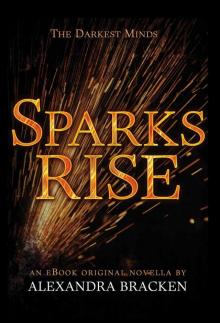 Sparks Rise
Sparks Rise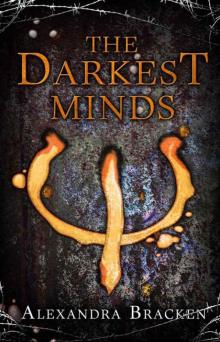 The Darkest Minds
The Darkest Minds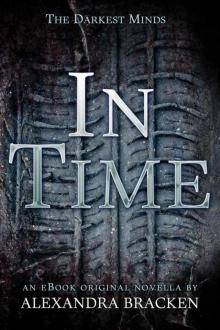 In Time
In Time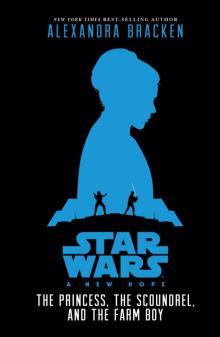 Star Wars: New Hope: The Princess, the Scoundrel, and the Farm Boy: Being the Story of Luke Skywalker, Darth Vader, and the Rise of the Rebellion (Novel)
Star Wars: New Hope: The Princess, the Scoundrel, and the Farm Boy: Being the Story of Luke Skywalker, Darth Vader, and the Rise of the Rebellion (Novel) Brightly Woven
Brightly Woven Wayfarer
Wayfarer In the Afterlight
In the Afterlight Passenger
Passenger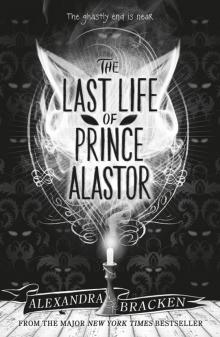 Prosper Redding: The Last Life of Prince Alastor
Prosper Redding: The Last Life of Prince Alastor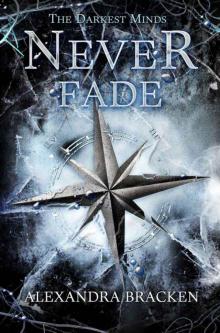 Never Fade
Never Fade Lore
Lore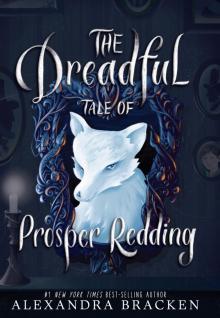 The Dreadful Tale of Prosper Redding
The Dreadful Tale of Prosper Redding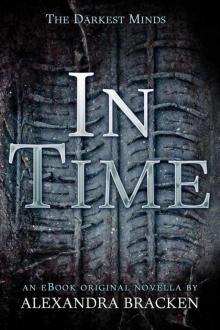 The Darkest Minds: In Time
The Darkest Minds: In Time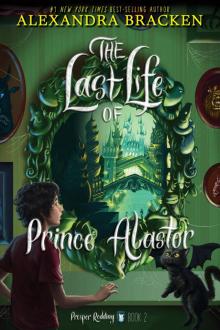 The Last Life of Prince Alastor
The Last Life of Prince Alastor In the Afterlight (The Darkest Minds series)
In the Afterlight (The Darkest Minds series) In the Afterlight (Bonus Content)
In the Afterlight (Bonus Content)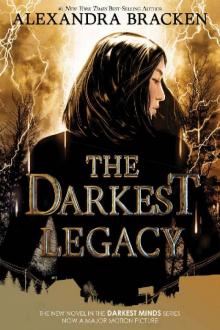 The Darkest Legacy (Darkest Minds Novel, A)
The Darkest Legacy (Darkest Minds Novel, A)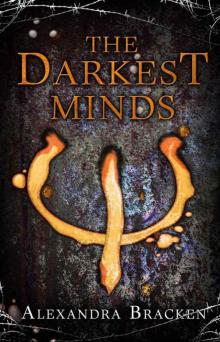 Darkest Minds (1) The Darkest Minds
Darkest Minds (1) The Darkest Minds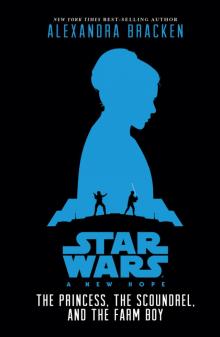 The Princess, the Scoundrel, and the Farm Boy
The Princess, the Scoundrel, and the Farm Boy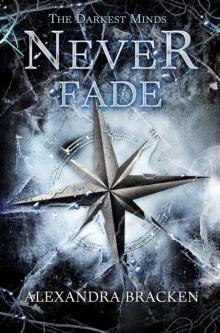 Never Fade tdm-2
Never Fade tdm-2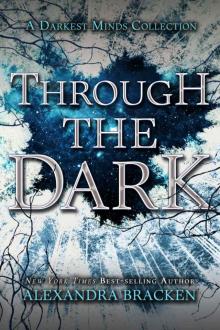 Through the Dark (A Darkest Minds Collection) (A Darkest Minds Novel)
Through the Dark (A Darkest Minds Collection) (A Darkest Minds Novel)